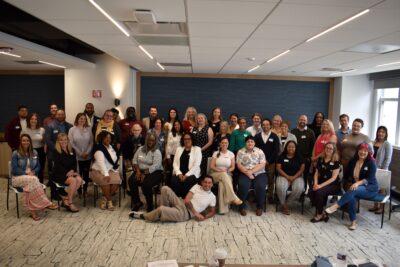A Q&A with Ranita Jain of the Annie E. Casey Foundation
 Young people, overall, were hit hard by the pandemic and experienced significant disruptions to employment. The good news is that unemployment for young adults is decreasing, and their labor force participation is recovering and close to pre-pandemic levels. However, it has been an uneven recovery at best. In this Q&A, Ranita Jain, senior associate in the Center for Economic Opportunity at the Annie E. Casey Foundation, discusses how Casey and the National Fund for Workforce Solutions are working together through the Generation Work initiative to connect more of America’s young adults – especially young people of color from low-income families – with meaningful employment by changing the way public and private systems prepare and support them in jobs.
Young people, overall, were hit hard by the pandemic and experienced significant disruptions to employment. The good news is that unemployment for young adults is decreasing, and their labor force participation is recovering and close to pre-pandemic levels. However, it has been an uneven recovery at best. In this Q&A, Ranita Jain, senior associate in the Center for Economic Opportunity at the Annie E. Casey Foundation, discusses how Casey and the National Fund for Workforce Solutions are working together through the Generation Work initiative to connect more of America’s young adults – especially young people of color from low-income families – with meaningful employment by changing the way public and private systems prepare and support them in jobs.
During our May State of Our Workforce conversation, you mentioned that not all young people are experiencing the labor market in the same way. Can you tell us more about how Generation Work seeks to address the inequities that some young workers experience?
In general, the job market for young people has bounced back since the worst days of the pandemic. But job recovery has been slower for young workers of color. Moreover, unemployment rates only tell part of the story. The majority of young people are employed in entry-level jobs in the service and care economy. These jobs often have lower-than-average starting wages, are part-time with schedules that change on an ongoing basis, and have higher levels of employee turnover. So, even though a young person is working, they still may not have a stable source of income, a schedule that supports both work and school, or supervisors who have the bandwidth to support their growth and learning on the job.
Through Generation Work, we want to improve the economic outlook for young workers by addressing these labor market dynamics and confronting the deeply rooted educational and employment inequities that have prevented many low-income people of color from accessing the opportunities needed to succeed. We believe that improving employment outcomes for young adults will contribute to their families, the communities they live in, and our overall economic prosperity.
Why is this initiative important right now? Are there certain conditions in the labor market that make Generation Work particularly germane in our post-pandemic economy?
Our workforce will soon be the most diverse in US history, so there is an urgent need to shift the conditions that are holding back young workers of color. It’s also important to recognize that it’s not just workers who are experiencing volatility in the current economy. Businesses are also operating in an uncertain environment that involves persistent worker shortages, supply chain issues, and rising costs. Attracting and retaining a diverse set of employees is essential to a firm’s profitability and competitiveness. Given this, we are seeing increased business interest and appetite for improving business practices, and Generation Work partnerships are supporting win-win solutions for both young adults and employers.
Let’s talk more about the Casey Foundation teaming up with the National Fund for phase two of Generation Work. What is the work focused on in the latest stage?
The second phase of Generation Work kicked off in 2022 and is focused on local partners working with employers to improve hiring, retention, and advancement practices in order to create and promote equitable employment opportunities for young people of color. We’re excited to partner with the National Fund for Workforce Solutions on this phase. The National Fund brings an important systems change lens to the initiative, and its suite of tools and frameworks — like the job design framework — can support local partners’ engagement with employers.
What communities are participating in Generation Work? Are there any early insights we’ve gained from working in these communities so far?
We’ve expanded the initiative to include eight cities — Birmingham, Cleveland, Chicago, Indianapolis, Louisville, Philadelphia, Seattle, and Wilmington, DE — and a diverse set of organizations are partnering in each of these communities. This helps us learn from a broad range of strategies and to support contributions to the field. Some insights we’re looking to gain include understanding what employer engagement strategies look like for specific populations of young adults, such as young immigrants or those who have been involved in the justice system, across sectors such as healthcare, manufacturing, and information technology, and what it looks like to work across systems — such as workforce and economic development.
 In June, we hosted our first joint meeting of all the Generation Work partnerships. What are your takeaways from the gathering?
In June, we hosted our first joint meeting of all the Generation Work partnerships. What are your takeaways from the gathering?
The meeting offered a chance for our partnerships to connect and engage with peers and to share progress on their efforts to support young workers of color. Given the diverse set of partners participating in the initiative, it was great to hear everyone’s unique perspective on the work. We were able to gain great insight into both what’s working and what challenges they are facing as they test out innovative engagement approaches. We all left energized and ready to carry Generation Work forward!
What’s on the horizon for Generation Work? What are you looking forward to in the coming months?
First, it’s an exciting period in the workforce field. There are federal policies that center equity. The workforce field can leverage definitions, frameworks, and tools to support creating better employment outcomes for young people. Generation Work partnerships are applying these definitions and tools in their engagement with employers. We’re looking forward to learning new employer engagement strategies that are being piloted by the partnerships participating in Generation Work. Seattle, for example, is piloting a Young Ambassador project where young adults will engage with employers to identify workplace practices that will help airport-based employers recruit and retain diverse talent. In Birmingham, partners are leading workgroups where young adults, employers, and workforce practitioners jointly identify and develop solutions that support hiring and retention of workers of color in tech jobs.



